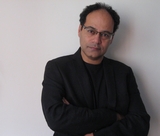Parker Bilal is the pen-name of Jamal Mahjoub. Born in London and brought up in Khartoum, Sudan, Mahjoub originally trained as a geologist and has written six critically acclaimed literary novels which have been shortlisted and awarded a number of prizes. His works include: In the Hour of Signs, Travelling with Djinns, The Carrier, and The Drift Latitudes.

To celebrate the Short Sentence crime writing competition, we talk to Parker Bilal, author of a major new detective series set in modern-day Cairo. The first in the series, The Golden Scales, reviewed by The Economist as "an absorbing, complex, lively novel...”, was released in February 2012.
What is the best writing advice you’ve ever been given?
I can never think of one single thing. Writing is a constant process of learning. You never stop. And the best way of learning is to read, as widely as possible. The old adage about 10% inspiration and 90% hard work certainly applies. Writing is really about re-writing, again and again.
You trained first as a geologist. What made you decide to write?
I always wanted to write, from quite a young age, but there was really not much hope of making a living that way so I had to think of something else to do in my spare time. I had a romantic notion of the life of a geologist, travelling around the desert, pondering the mysteries of nature. I turned out to be the worst geologist ever, and instead wrote a novel about someone doing what I had originally imagined myself doing. Fiction triumphs over fact!How does your writing process for a crime novel, like The Golden Scales, differ from your previous works?Crime novels are driven by plot. They have to tick along like clockwork. This is not to say that plot has no place in literary fiction, but my previous novels wander about, seeking their own inner logic. A crime novel is more like a bullet.
Why did you decide to use a pen-name?
I intend to continue publishing other kinds of novels and this is just a way of keeping the two things separate in my head. I tend to have a lot of projects in my mind at the same time. Plus, I’ve always liked the idea of reinventing myself as someone new.
Tell us how you landed your first publishing deal.
The great levelling power of literature lies in the fact that anyone with a piece of paper and a pencil can write. I’ve always had faith in the idea that if you have a story to tell and the determination to tell it, you will get through. In retrospect, I was pretty naïve about how the whole system worked. I didn’t even have an agent. I sent the manuscript round, one publisher after another, until eventually someone decided to take a chance.
Each month a short story by one of Bloomsbury’s crime authors will be featured on the Short Sentence site thus setting a theme and laying down the creative gauntlet.Read Parker Bilal's featured story here.
Geology isn't that bad, its where the money is these days!
'I can never think of one single thing. Writing is a constant process of learning. You never stop. And the best way of learning is to read, as widely as possible. The old adage about 10% inspiration and 90% hard work certainly applies. Writing is really about re-writing, again and again.'
I agree with most of the advice given above. However I believe it is 100% sweat, as an author should already have the inspiration.
Reading is vital to improving writing skills.
Raleigh. 'Good novelists are great novel readers'.